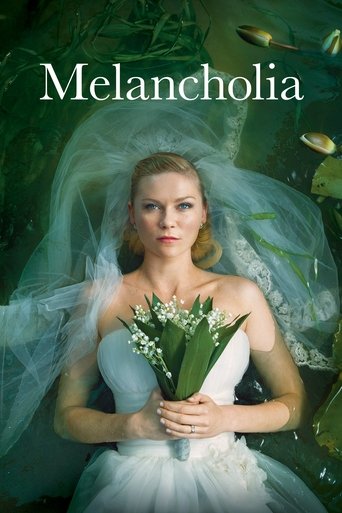«Наслаждайтесь, пока это длится»
"Melancholia," a 2011 cinematic masterpiece produced by Zentropa Entertainments and Memfis Film in Denmark and France, is a haunting exploration of existential dread and cosmic insignificance. Directed by Lars von Trier, the film delves into the psychological unraveling of its protagonist, Justine, portrayed with raw intensity by Kirsten Dunst. As the story unfolds, a rogue planet named Melancholia looms ever closer to Earth, serving as a metaphor for the impending doom that Justine feels internally. The film's opening sequence, a slow-motion montage set to Wagner's "Tristan und Isolde," sets a tone of inevitable catastrophe, drawing viewers into a world where personal and planetary collapse are inextricably linked. The narrative is divided into two distinct parts, each focusing on a different sister: Justine and Claire. In the first part, we witness Justine's descent into depression on her wedding day, despite the efforts of her sister Claire (Charlotte Gainsbourg) and brother-in-law John (Kiefer Sutherland) to keep the celebration afloat. The opulent setting juxtaposed with Justine's growing detachment creates a palpable tension, highlighting the disparity between societal expectations and personal turmoil. The second part shifts focus to Claire, who grapples with her own fears as Melancholia's approach becomes undeniable. Her anxiety contrasts sharply with Justine's eerie calm, illustrating the varied ways individuals confront their mortality. Visually, "Melancholia" is a stunning achievement, with cinematographer Manuel Alberto Claro's use of light and shadow enhancing the film's melancholic atmosphere. The deliberate pacing allows for moments of quiet introspection, punctuated by bursts of emotional intensity. The film's use of symbolism, particularly the recurring image of horses, adds layers of meaning, representing both freedom and impending doom. The performances are uniformly excellent, with Dunst delivering a career-defining portrayal of depression, earning her the Best Actress award at the Cannes Film Festival. "Melancholia" is not merely a film about the end of the world; it is a profound meditation on the human condition, exploring themes of despair, acceptance, and the search for meaning in the face of oblivion. Lars von Trier's bold vision and unflinching approach to storytelling make this film a compelling, if unsettling, experience. It challenges viewers to confront their own fears and anxieties, ultimately leaving them with a sense of the sublime beauty found in life's impermanence.
Год2011
Домашняя страница
Бюджет7400000$
Продолжительность130 мин
Доход15946321$
Жанрыдрамафантастика
Страны производстваDenmarkFranceGermanySweden







